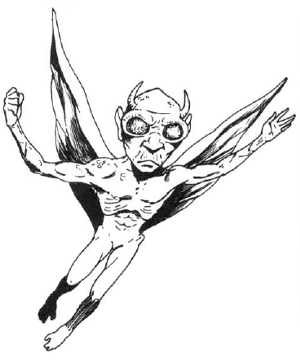

MC Volume Two

| Climate/Terrain: | Temperate to tropical/Hills and mountains |
|---|---|
| Frequency: | Rare |
| Organization: | Gens |
| Activity Cycle: | Night |
| Diet: | Omnivore |
| Intelligence: | Low (5-7) |
| Treasure: | J (Q×5) |
| Alignment: | Neutral evil |
| No. Appearing: | 3-300 |
| Armor Class: | 8 |
| Movement: | 6, Fl 15 (C) |
| Hit Dice: | 1-5 |
| THAC0: | 2 HD: 19 3-4 HD: 17 5 HD: 15 |
| No. of Attacks: | 1 |
| Damage/Attack: | 1-3 or 1-4 (weapon) |
| Special Attacks: | Rock Bomb |
| Special Defenses: | Nil |
| Magic Resistance: | Nil |
| Size: | S (3’ tall) |
| Morale: | Unsteady (7) |
| XP Value: | 2 HD: 35 3 HD: 65 4 HD: 120 5 HD: 175 |
These aggressive, flying humanoids are distantly related to kobolds.
Urds stand three feet tall and have short ivory horns, red-rimmed eyes. and flattened noses. Their bodies are thin, frail and covered with mottled yellow to brick-red scales. Leathery, batlike wings sprout from their backs. When flying, the wings stretch eight feet or more across. Urds are quick and maneuverable in the air, capable of gliding for long distances or pulling up sharply. On land, urds slouch to counterbalance the wings on their back and move with an awkward half-walk, half-hop gait. Urds wear minimal clothing, but many tribes decorate their bodies with paints made from berries and ground bone.
Urds speak their own language, as well as kobold, and a smattering of common.
Combat: Urds hunt in great flocks at night, using their infravision (60-foot range) to spot prey on the ground below. Urds attack by dropping stones upon their victims. These “rock bombs” weigh two to three pounds apiece and are covered with jagged edges and protrusions. Urds drop these rocks with great accuracy. Unsuspecting victims are treated as AC 10 for the attack roll. Actively dodging opponents are considered AC 2 before modifications for Dexterity. Each rock that hits causes 2d4 points of damage. About 75% of the urds encountered carry one rock bomb apiece. The remaining 25% carry light spears, which can be used either as spears or as javelins. These light spears cause 1d4 points of damage per hit.
Urds are unreliable in large battles. They are easily startled, particularly by bright lights, such as fireballs, or by large flying creatures. Urds avoid melee unless they outnumber their opponents by 10 to 1 or more; even then urds attack only if their victims are unarmored and no larger than man-size.
Habitat/Society: Urds live in extended families called gens. A single gen may contain 300 or more adult males and females, plus a number of young and eggs equaling 50 percent of the total adult population. Each gen is controlled by a hereditary chieftain that can be of either sex.
Urds usually make their lairs in isolated mountain caves or, when no mountains are near, in carefully concealed underground caverns. An urd lair comprises one main chamber plus a number of smaller chambers for the young and eggs. Urds often (70% chance) share their homes with giant bats, keeping them as pets and guardians.
On the whole, urds are unintelligent and easily frightened. They are quick to attack weaker foes, such as kobolds and goblins, and readily submit to more powerful creatures. Urd gens often swear fealty to wizards or dragons, especially if promises of food are made. Units of mercenary urds are sometimes employed by larger armies as scouts or messengers.
For every 20 urds encountered there is one subchieftain with 7 HD and an AC of 7. Urd flocks of 100 or more are always accompanied by the gen’s chieftain. The chieftain is an exceptional urd with 10 HD and is 50% likely to be wearing magical leather armor. The urd lair always contains 1d6 shamans who, in addition to their other abilities, can speak with bats as per the spell speak with animals.
Ecology: Urds place little value on gold and other heavy metals, since these are difficult for urds to fly with. They prize finely made leather armor and gladly trade for such items.
The diet of urds varies dramatically from gen to gen, depending upon what (or who) is available and upon the ferocity of the gen. Some gens live on fruits and small animals, others hunt larger game, and a few of the more aggressive gens live almost exclusively on goblins, men, elves, etc.
Urds are hunted by a variety of the avian carnivores, including hippogriffs, manticores, and dragons. Their life spans can theoretically exceed 100 years, but few urds survive past the age of 50.
